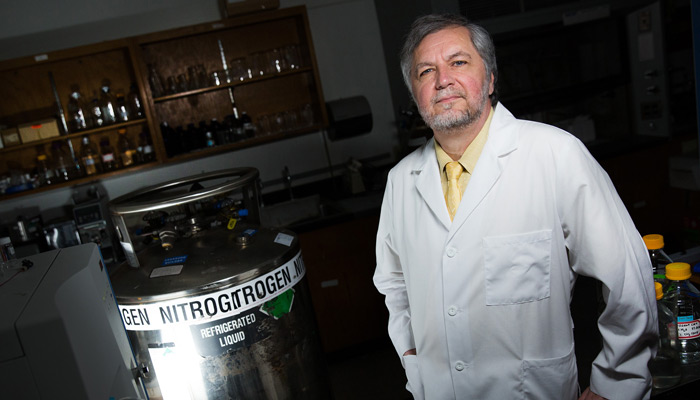Treating hot flashes without the side effects
Experimental drug could treat hot flashes, other symptoms of menopause without harmful side effects
Researchers have discovered an experimental medication that treats hot flashes and other menopausal symptoms without the life-threatening risks of hormone replacement therapy, according to a team led by a UNT Health Science Center scientist.
In a study appearing in the July issue of the influential journal Science Translational Medicine, researchers explain how the medication, which they call DHED, is selectively converted to estrogen only in the brain.
“The rest of the body does not recognize DHED, but the brain does and metabolizes it to estrogen,” said Laszlo Prokai, PhD, Professor and Robert A. Welch Chair in Biochemistry. “Since DHED delivers estrogen only in the brain, it spares other organs from hormone exposure, along with its side effects.”
Although DHED has yet to be tested in human clinical trials and approved by regulatory agencies, it holds promise for the millions of women who experience hot flashes, depression, impaired cognition and other neurological and psychiatric symptoms due to estrogen deprivation during menopause. Other patients, such as those who suffer from ischemic stroke, also could benefit from the brain-selective estrogen neuroprotection provided by DHED treatments.
For decades women took hormone replacement therapy – estrogen and progestin – to reduce hot flashes and protect their health. But in 2002, large-scale clinical trials investigating the long-term health benefits of hormone therapies based on equine estrogens raised concerns that such therapy had life-threatening risks such as cancer.
As a result of those trials, collectively known as the Women’s Health Initiative, many women immediately stopped taking hormones. Yet estrogen-based medications have remained the most effective remedies of menopausal symptoms in current medical practice.
“Hormone replacement therapy is still in use, but women are urged to take the smallest dosage for the shortest time to avoid the risks,” Dr. Prokai said.
Recent studies, however, have found symptoms can persist for 10 or more years, leaving women with no viable long-term treatment.
“Restricting estrogen to the brain makes it possible for women to use a smaller dose for a longer period,” Dr. Prokai said. “Our medication could be an effective and safe intervention for women to relieve neurological and psychiatric maladies linked to menopause.”
UNT Health Science Center research was supported in part by funding from the National Institutes of Health and The Welch Foundation.





Social media